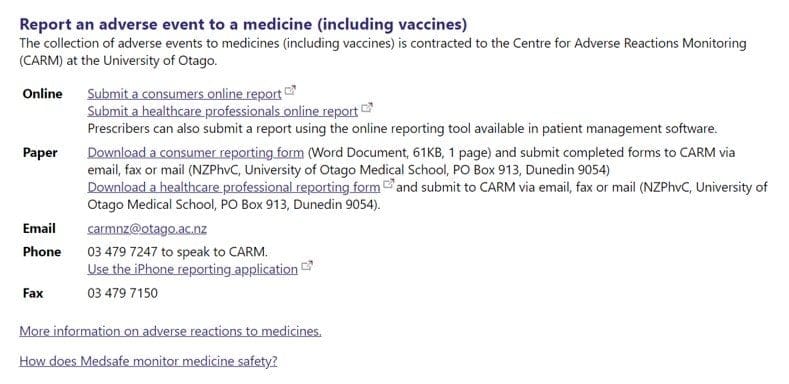Table of Contents
New Zealand Doctors Speaking Out with Science
If you or someone you know has experienced an adverse event following immunisation (AEFI), it is important to report it to CARM. Determining whether an adverse event has been caused by a pharmaceutical product is the role of CARM, who are part of the New Zealand Pharmacovigilance Centre at Otago University.
Whilst it is unclear what methodology CARM are using, the Bradford Hill Criteria for Causality is one useful tool for helping to determine cause-and-effect relationships in epidemiology. A range of information is necessary in the process of determining causation, including the detection of patterns in the population. If reports are not made then patterns cannot be detected.
The general public and even health professionals often presume that they should only report an adverse event if they personally believe that there is a link. This is incorrect, as patterns can only be detected through a centralised monitoring system such as CARM.
In April 2021 every registered health professional in New Zealand was provided with written instruction to promote the benefits of Covid-19 vaccination. This, combined with the threats to registration and employment that many health professionals who dared to discuss the risks have faced, has led to an environment of apprehension within health services.
We commonly hear from people seeking medical assistance for vaccine injury, about a spectrum of behaviours exhibited by health professionals. Some doctors will dare to say they consider a diagnosis to be related to the Covid-19 injection but refuse to write it down; some explain their licence may be threatened if they make a report. Others agree with the suspicions of their patient at one consultation, and contradict themselves at the next. Nurses have whispered to patients that they are seeing many similar injuries, including amongst colleagues, and quietly recommend against further doses. Many patients report being derided by doctors and nurses who deny their injury or insist that physical symptoms are psycho-somatic (all in the head).
Because of this climate of fear and denial, many injuries are going unreported to CARM.
Reports can be made by patients or their advocates and do not need to come from a health professional.
How To Complete a CARM Report
Ways to report an adverse reaction to a medicine, including vaccines, are provided on the Medsafe website.

The most efficient way is to make an online report via the Covid-19 Vaccine Adverse Events Form. This process requires a degree of computer skill, so if you are not confident we recommend having someone assist you.
It is vital once the form has been completed, that you record and keep the reference number provided on the completion page. Some reports are pre-filtered out by MOH (where ALL these reports now get sent first), and do not make it to the CARM assessors let alone to the final Medsafe database. Incredibly, as they roll out the brand new bivalent booster, Medsafe have stopped the public facing routine AEFI reporting! Your screenshot or photo may be the only proof you ever submitted a report.
Adverse events can also be reported to The Health Forum New Zealand (click on “Share Your Experience Now”), for entry onto the Citizens’ Database. This serves as an independent reporting system which may offer different or better data and analysis as it is not aligned with government systems such as CARM which are associated with the undisclosed pharmaceutical company contracts and taxpayer-funded vaccine promotion campaigns.









